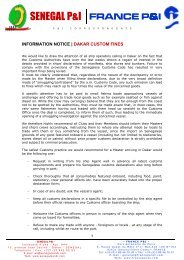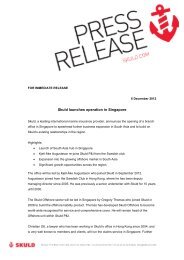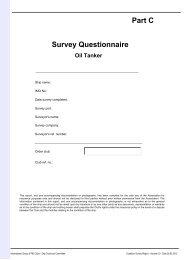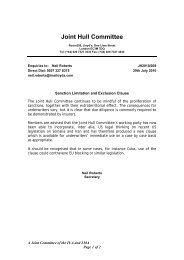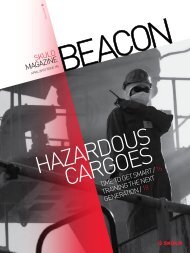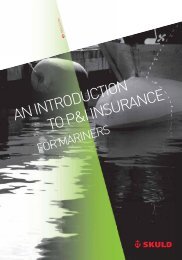Complete PDF version - Skuld
Complete PDF version - Skuld
Complete PDF version - Skuld
- No tags were found...
Create successful ePaper yourself
Turn your PDF publications into a flip-book with our unique Google optimized e-Paper software.
skuld.com<strong>Skuld</strong>magazineMARCH 2011 / issue 199<strong>Skuld</strong>DEFENCEFailing inspection / 16Citadels and armedguards / 23
ViewpointDouglas JacobsohnCEOExcellentgrowthDuring 2010, additional quality tonnage from both existing and newmembers gave <strong>Skuld</strong> growth of 14%. In comparison, this is more thandouble the average growth rate in the International Group of P&I Clubs.Successful renewals added another 3 million GT from new <strong>Skuld</strong>members, resulting in a current owners’ P&I portfolio of 63 million GT.beacon March 2011/ issue 199We thank all members and clients who renewed with <strong>Skuld</strong> or joinedthe club for the first time.More than ever, our focus is on fact-based, professional underwriting.If the current EU investigation finds that the International Groupcontravenes its rules, the P&I sector will need considerable restructuring,for which we should all be prepared.Increased presence<strong>Skuld</strong>’s strong reputation enables us to retain existing clients andattract new ones despite a ridiculously soft market. Our presence inthe offshore sector is increasing and we’ve seen positive development for<strong>Skuld</strong> 1897 at Lloyd’s. Thanks to the dedication of our P&I membershipworldwide, the new syndicate is ‘harvesting crops from <strong>Skuld</strong>’s fields’.Photo: ALAMY.NO Photo: AFPOn the downside, the cost of dealing with claims escalates every yearand new regulations and legislation pose a constant challenge.<strong>Skuld</strong> Defence<strong>Skuld</strong> Defence cover helps our members and clients navigate inconstantly more complicated legal waters. Read about our competenceand the services we offer in this issue of Beacon.Douglas Jacobsohn<strong>Skuld</strong>magazinebeaconMARCH 2011 / Issue 199Beacon (<strong>Skuld</strong> Magazine) is the official publication of Assuranceforeningen <strong>Skuld</strong> (Gjensidig)Address P.O. Box 1376 Vika, NO-0114 Oslo, Norway, Tel +47 22 00 22 00, Fax +47 22 42 42 22E-mail ingeborg.berge@skuld.com editor in chief Ingeborg Berge Editorial staff Lise LarsonLayout Transmission AS Repro and printing 07 Group Front page <strong>Skuld</strong> Defence, Oslo.Photo: Blunderbuss. Entire contents ©2011, all rights reserved. Reproduction in whole or in part,without written permission from <strong>Skuld</strong>, is prohibited. Opinions expressed by writers in Beaconare not necessarily those held by <strong>Skuld</strong>. <strong>Skuld</strong> assumes no responsibility for unsolicited materialWWW.SKULD.COM23Citadels andarmed guardsPiracy, in particular off Somalia, increasingly dominatesinternational headlines and affects an ever-increasing area.On 16 December 2010, the Joint War Committee of theLloyd’s Market Association extended their ‘listed areas’ byadding the Indian Ocean, Arabian Sea, Gulf of Aden, Gulf ofOman, Southern Red Sea and the waters enclosed by theseboundaries.
Written byName SurnameJob title, <strong>Skuld</strong>name.surname@skuld.comNEWS feature LEGALSKULD DEFENCE issues/article introheadingIntro textText“quote fromtext”ECivil disorder, multi-party chain collapse, contract repudiation,extraordinary demurrage claims, payment defaults... The list isnever-ending. With increasing litigation worldwide there isgreater need for legal services that assist members in dealingeffectively with commercial disputes, and a defence team thatguides its members through the turmoil of global events.”read morewww.address.combeacon / MARCH 2011 5
NEWS featureSKULD DEFENCEIntroducing <strong>Skuld</strong>’s Defence service<strong>Skuld</strong> DefenceThere has been increased interest in defence within the shipping industry in recent years, particularlysince the finance crisis. Over the following pages we illustrate cases and issues, and broadly explainour structure and philosophy. We also provide a glimpse of the individuals manning the ramparts ofour defence ‘outposts’ around the world.What is Defence?Otherwise known as FDD (Freight, Demurrage and Defence (or Deadfreight)),defence is a separate cover available to members, in additionto standard P&I, upon payment of an extra premium. Technically, itprovides support for legal costs incurred in resolving meritorious legaldisputes of the kinds listed in our rules. The difference with P&I isthat defence deals with underlying commercial disputes, which areotherwise uninsured.Why Defence?The world is rapidly becoming more litigious, as shown by the barchart on this page. Commercial matters that were resolved privatelywithout resort to lawyers or legal proceedings are more likely to end inlitigation. Arbitration, which was originally intended as an alternative tocourt proceedings, is now far more formal and adverse in nature.Judicious use of defence assists operators in dealing more effectivelywith their commercial dispute burden.Why Defence in <strong>Skuld</strong>?<strong>Skuld</strong> has offered the defence product service since the early 1980s. Itsorganisation evolved in step with <strong>Skuld</strong>’s corporate development andits structure dovetails with management of members’ businesses, i.e.within the members’ particular syndicates.Defence at <strong>Skuld</strong> imparts much more than just cost cover. Defence givesmembers access to a comprehensive dispute management system.The service may range from initial comments on a discrete issue tonegotiation and ultimate resolution of a dispute. Its range and breadthis not easily noticed at first glance, but when a dispute arises we areable to implement this range of services from the first moment thematter lands on the lawyer’s desk.The engine of our response is the highly qualified staff of lawyers inour offices worldwide who handle defence matters on a daily basis.Defence lawyers thrive professionally within the local syndicateenvironment. They are closely in tune with the daily pulse of members’businesses. This is vital to the defence lawyer’s understanding of theindividual member’s expectations and enables a more tailoredresponse.“Defenceassistsoperatorsin dealingmoreeffectivelywith theircommercialdisputeburden”All appointments,including ICP, FALCA, SCPfrom 2000 to 2009 (2010 figureunpublished at time of print)Source: LMAA2,6732,6303,0272,9192,6182,2192,8252,757xxxx4,4453,68420102009200820072006200520042003200220012000Given the global nature of shipping,<strong>Skuld</strong> has lawyers on staff whoare qualified in 16 differentjurisdictions. Our offices in Oslo,Copenhagen, Hamburg, HongKong, Piraeus and New York allhave well-qualified defencelawyers. Even though our defencelawyers are stationed in thesyndicates, some of which are atconsiderable distance from eachother, modern communicationfacilitates close, fast contactenabling us easily to coordinatein a consistent way.The innovative, coordinated andpro-active approach taken by ourlawyers in all syndicates allowsthe club to tackle a wide varietyof issues. For example, duringthe recent finance crisis, ourlawyers were able to adapt rapidlyto changes forced by multi-partycharterparty chain collapse,complex bankruptcy, FFA disputesand the rise and fall of Rule B,just to name a few of the criticalissues we faced.The amalgamation of the esteemedDanish Defence Associationof Copenhagen into the <strong>Skuld</strong>family (see page eight) furtherstrengthens <strong>Skuld</strong> Defence andthe services we offer.6 beacon / MARCH 2011
By Frank RileySenior Vice President, <strong>Skuld</strong> Defencefrank.riley@skuld.comNEWS featureSKULD DEFENCE/Frank Riley (centre) leads a <strong>Skuld</strong> Defence meeting in Oslo through the intricacies of a pending case.Photo: BlunderbussKeeping matters out of litigationLong-term dispute litigation robs members of time and money. It isexcessively expensive and can destroy commercial goodwill amongbusiness partners. Our wish is, through early intervention, to avoidlitigation and thereby avoid these negative effects. The early stages ofa dispute often present unique opportunities for quick and satisfactoryresolution that may disappear later in a case. Early intervention is awin/win proposition, as members concentrate on doing business,whilst the club keeps costs down and has time to focus more broadlyon member affairs.This requires us to be flexible and practical. Quick, practical advice isoften what members want – rather than long legal opinions – and itmay be enough to dispatch a brewing dispute before it ripens into openconflict. Our defence lawyers are well equipped to assist in this way.All alternatives to litigation are explored. As mentioned, we initially tryto negotiate directly, or assist members in their own negotiations.If this does not succeed, other means short of legal process areinvestigated. Mediation has rapidly taken its place in the range ofoptions available and we have found through experience that it is a veryvaluable tool. We have lawyers in <strong>Skuld</strong> who have developed expertisein this field.If matters do end in litigation, which unfortunately is sometimesunavoidable, it is the club’s job to manage this in the most efficientway, i.e. to bring about a satisfactory decision (negotiated or adjudicated)as quickly as possible, and at the least possible cost. When mattersare referred to arbitration there are many ways to avoid disproportionateprocedures, for example by exploring single-arbitrator alternatives orsingle-decision references. Even though disputes may end in litigation,<strong>Skuld</strong> continues to explore ways to resolve them satisfactorily short ofa full trial.<strong>Skuld</strong>’s defence lawyers are subject to rigorous routines, which requirecontinuous evaluation of the merits of underlying claims and the costsrequired to deal with them. This serves members’ interests by rapidlyresolving disputes. Close scrutiny and oversight of external legal servicesis a critical part of the process.Ultimately, our aim is to protect members’ interests by providing firstclassservice, while maintaining close cost surveillance.read morewww.skuld.com/Products-and-Services/Defencebeacon / MARCH 20117
NEWS featureSKULD DEFENCEHelle Lehmann discusses the DDC mergerand its implications for membersDDC members and chartering clients now benefit from full-scale defence cover from a common <strong>Skuld</strong> platform, with access to the entire global defence network,” says Helle Lehmann.Danish Defence Clubmerges with <strong>Skuld</strong> DefenceOn 1 January this year, Danish Defence Club (DDC) merged with <strong>Skuld</strong> Defence. Helle Lehmann,SVP Head of Office, <strong>Skuld</strong> Copenhagen explains the rationale behind the restructuring and whatthis means to members.First, what was the Danish Defence Club?“It was a respected defence association,100% owned and controlled byits members. It provided FDD cover to its members, including assistanceand counsel on maritime law.Why did <strong>Skuld</strong> want to merge?For many years, DDC was closely associated with <strong>Skuld</strong> Denmark. Thetwo organisations shared offices, management and staff. This long-termrelationship has clearly been beneficial to both organisations.However, time changes and we saw the need for a more moderndefence operation in Copenhagen. Any duplication in services andadministration is now removed, which makes operations cleaner andmore efficient.What does the merger mean to DDC members?“From the start of this year, <strong>Skuld</strong> has renewed FDD covers largelyunder the same terms as before. The same staff continues to work onthe same business, so members and clients should experience a8 beacon / MARCH 2011
NEWS featureSKULD DEFENCE/seamless transition into <strong>Skuld</strong>. Naturally, any DDC cases will be followedthrough to their best possible conclusion under the <strong>Skuld</strong> umbrella.DDC members and chartering clients now benefit from full-scaledefence cover from a common <strong>Skuld</strong> platform, with access to theentire global defence network. This significant increase in resources,knowledge and ‘fire power’ enhances our service effectiveness. It isalso very important for us to have a deeper knowledge and understandingof our members’ and clients’ businesses because we firmlybelieve that we are much better prepared to provide an optimal andtimely service if we know more. We therefore invite them to shareinformation on their business models and operations.As a whole, <strong>Skuld</strong> Defence is developing its future FDD service. Oneidea we are working with is a member- and client-based DefenceWorking Committee consisting of representatives from key sectors ofthe shipping industry. They will be invited to provide feedback on ourdefence service and to give further insight into shipping markets toenable us to better develop our services for the future.<strong>Skuld</strong> Defence in Copenhagen is working on ‘Best Future Practice’ to help optimise itsservice to members and clients.How did the idea of merging DDC with <strong>Skuld</strong> become reality?During 2010, <strong>Skuld</strong>’s management and DDC’s board worked closelytogether to merge the two organisations. After extensive negotiations,an effective solution was established for both parties that enabledDDC’s portfolio to be transferred to <strong>Skuld</strong>. When the concept and draftagreement were ready, DDC held an Extraordinary General Meeting inCopenhagen on Friday 12 November 2010 where members unanimouslyvoted in favour of the board of directors’ proposal to amalgamate DDCwith <strong>Skuld</strong>.DDC commenced preparations for voluntary liquidation, which shouldbe complete by 30 June 2011 at the latest. The DDC rules and <strong>Skuld</strong>Defence rules contain no material differences. In <strong>Skuld</strong>, memberscontinue to enjoy the same cover and general service previouslyprovided by DDC.Where is the new organisation located?Since September 2010, the Copenhagen office has been located inrenovated and modern single-floor offices in central Copenhagen.This simplifies communication with colleagues, which again helpsworking conditions considerably and enhances team spirit./DDC – the beginning/ At the start of the 20th century, aconsiderable increase in world tradebecame a reality. This was reflected inthe booming business of a large numberof Danish shipowners. As the growingcomplexity of shipping contractscreated an increasing need forprofessional legal assistance, the ideaof a defence club was fielded. Theresult was the DDC, founded inNovember 1924 by a number ofDanish shipowners, includingA.P. Møller-Mærsk, Torm, J. Lauritzenand DFDS.How has staff reacted to the change?The merger and relocation to modern offices are seen as very positiveindeed. We have commenced work with ‘Best Future Practice’, coupledwith fulfillment of our values of conducting business in an accurate,bold, caring and dedicated manner. With competent and dedicatedstaff – including experienced lawyers and mediators – we feel wellprepared for future challenges enabling us to continue being a goodpartner for our members and chartering clients.beacon / MARCH 2011 9
NEWS featureSKULD DEFENCEDemurrage time-bar clausesCalling timeTwo recent cases in the English courts emphasise once again how vital it is to strictly adhere todemurrage time-bar clauses in charterparties and the risks associated with failure to complycompletely with their requirements. Members are well advised to take particular note of the line takenby the courts and ensure that requirements set down in such clauses are strictly complied with.Demurrage time-bar clauses have a wide range of different wordingsand effects, but generally their purpose is always the same; namely anexpress provision specifying that demurrage and other claims must bebrought within a certain time limit and/or with certain documentarysupport, failing which the defaulting charterers are discharged fromdemurrage liability they would otherwise be obliged to pay.Generally, English courts interpret demurrage time-bar clauses verystrictly and uphold charterers’ rights to rely on these clauses to avoidpaying demurrage where formalities contained in the clause are notstrictly complied with. Two recent cases underline this position andre-emphasise the hard judicial line being taken. Before looking atthese recent cases, we briefly overview the legal background to theinterpretation of these clauses.Taking a step backThe starting point is the judgement of Bingham J. in The Oltenia [1982]1 Lloyd’s Rep. 448. This case involved an Asbatankvoy form demurragetime-bar clause, which provides that any liability for demurrage isdischarged unless “a claim has been presented to charterers in writingwith all available supporting documents within 90 days from completion ofdischarge”. No claim or documents were provided within the 90-dayperiod and the final claim was accordingly held to be time-barred.Bingham J. states in his judgement that the commercial intentionunderlying this clause was to ensure that claims were presented byowners within a short period after final discharge to enable charterersto investigate further and establish the claim’s validity.This same rationale is applied and expanded in The Sabrewing [2008] 1Lloyd’s Rep. 286. In this case, owners provided documents to supporttheir demurrage claim, but did not provide signed pumping logs. Thecourt held that the claim was time-barred because it was not fullysupported by sufficient documentation within the 90-day time limitfrom discharge. Gloucester J. emphasised that demurrage time-barclauses had to be complied with carefully and strictly, and that thecommercial purpose of such clauses was to achieve finality.English courts tend to interpret demurrage time-bar clauses very strictly and upholdcharterers’ rights.Photo: ALAMY.NO10 beacon / MARCH 2011
By Nik Ivanov and Mattias HedqvistAssistant Vice Presidents, Lawyers, <strong>Skuld</strong> Oslonikolai.ivanov@skuld.commattias.hedqvist@skuld.comNEWS featureSKULD DEFENCE/Don’t delay – comply completely with demurrage time-bar clauses and ensure all documentation is attached.Against this legal background, we turn to two notable and recent casesthat underline and expand the approach adopted by the courts.Give noticeIn the first case, The Eagle Valencia [2010] 2 Lloyd’s Rep. 257, theclaimant shipowners tendered two NORs (notices of readiness), butonly submitted the first NOR (on which they relied) with the claim. Inthe Court of Appeal, it was held that the original NOR was invalid. Itwas then questioned whether the owners’ alternative demurrageclaim, based on the second NOR which had not been submitted withthe claim, was time-barred. The clause required “any demurrage claimshall be fully and correctly documented and received by charterers, within90 days after completion of discharge”. The claim was held to be timebarred.In the leading judgement, Mr. Justice Longmore said:“...an essential document in support of every demurrage claim is thenotice of readiness and, if the only notice of readiness submitted is acontractually invalid notice, the claim cannot be said to be “fully andcorrectly documented” [...]. That is not necessarily to say that alternativelaytime statements and invoices would always have to be submitted toavoid the extinction of an alternative claim but merely to say that thedocuments to be submitted pursuant to the clause must include a validnotice of readiness.”“anydemurrageclaim shallbe fully andcorrectlydocumentedand receivedby charterers,within 90days aftercompletionof discharge”In the second case, NationalShipping Company of Saudi Arabiav BP Oil Supply Company [2010]EWHC 3043 (Comm), the relevanttime-bar clause required that “allsupporting documentationsubstantiating each and everyconstituent part of the claim”should be submitted within acertain number of days.Document itThe case involves a vessel loadedby ship-to-ship transfer from twodifferent vessels at the same berth.Owners submitted sufficientdocuments in support of one claim(related to time and bunkers)without referring to laytime ordemurrage. Submission ofdocuments for this first claimwas held insufficient to supportbeacon / MARCH 201111
NEWS featureSKULD DEFENCEBy Nicola MasonVice President <strong>Skuld</strong> Far East Syndicatenicola.mason@skuld.comDefence cover and its relationship with ‘current affairs’NewsworthyRecent Australian floods and cyclone Yasi have severely impacted life,property and the export of commodities. “...Queensland’s coal industryis already facing lost production equivalent to about five percent of exportsthis year because of massive flooding in January. Several of Queensland’scoal ports have halted operations ahead of Cyclone Yasi.” (Reuters)Mining, rail transportation to and from the mines and loading operationsat the export terminals have been affected. Leading producers BHPBilliton and Rio Tinto have declared force majeure.Yielding to the greater forceA force majeure clause acts like an exceptions clause, excusing a partyfrom liability if some unforeseen event beyond its control preventscontractual obligations being fulfilled. In fact, force majeure literallymeans ‘greater force’. Examples are acts of God, flooding, riots,strikes, wars or any other non-controllable event.Many force majeure clauses in coal industry contracts refer to disruptions,stoppages and slow downs at the mines, on the railways or at theterminals. Most clauses require force majeure to prevent a party fromperforming its obligations. They provide procedural mechanisms forthe declaration of the force majeure event and the invocation of therelief allowed by the force majeure clause. For example, relief may betemporary suspension or contract cancellation.Under English lawFor a party to rely on the clause it must show:1. A clear clause in the contract covering the situation2. That in fact the situation has occurred3. Or that the wording in the clause is wide enough to excuseperformance where an unspecified event beyond the control ofthe party has occurred4. There is a causative link between what has occurred and theparties inability to perform. For example, although the mine is flooded,there may be a large stock of coal at the terminal, which allowsloading to continue without disruption. In this case, the forcemajeure clause cannot be invoked5. Procedures for declaring force majeure in the clause must befollowed correctly, e.g. keeping to time limits.No roads, no transport. Severe flooding gives reason to declare force majeure.Commercial negotiationsIf, after investigation, it is likelythat force majeure has occurredand the clause is properlyinvoked, one may without prejudice,contact the defaulting party andsee whether the contract can bepostponed or mutually cancelled.This works effectively if forcemajeure is invoked well before thevessel is due in port. <strong>Skuld</strong> hasassisted members recently withsimilar commercial solutions.Egyptian unrest and itseffect on SuezSo far, the Egyptian crisis has notclosed the Suez Canal, althoughsupporting logistics services,such as bunker operations, crewtransfers and communications,are all adversely affected. <strong>Skuld</strong>is monitoring events closely and,if the situation deteriorates, isready to assist.In conclusion, <strong>Skuld</strong> Defence coverprovides a wealth of legal andpractical advice to help membersdeal with global events.Photo: AFPread morewww.skuld.com14 beacon / MARCH 2011
News NEWS featureSKULD DEFENCE/Flooding affected this coal mine nearBaralaba in Queensland.Photo: REUTERSbeacon / MARCH 2011 15
NEWS featureSKULD DEFENCEMOA disputes – claiming for a vessel’s conditionFailing inspectionMembers agreed to purchase a vessel owned by a single-purpose company. Prior to delivery, theyarranged for pre-purchase inspection in accordance with the standard provisions under Clause 11of the Norwegian Sales Form 1993. The inspections revealed a number of defects.Position under contractThe contract contained the following protective provisions for themembers:Provision 1: The vessel shall be delivered and accepted and taken overas she was at the time of inspection, fair wear and tear excepted;Provision 2: The vessel shall be delivered with her class fully maintainedwithout condition/recommendation; andProvision 3: The vessel to be delivered in accordance with the latestIMO/MARPOL/SOLAS/USCG regulations applicable for foreign-flaggedvessels trading in the US.Legal and practical implicationsProvision 1: To the extent that it is established that damage found ondelivery occurred after inspection, a claim may be brought under thisprovision. However, as the burden of proof falls on the buyer, it is oftendifficult to establish whether the defect existed at the time of inspectionand to what degree it may have deteriorated since that time. This leadsto difficulties in quantifying damages for such deterioration.Provision 2: The courts hold that this provision relates only to thepaperwork at class and not the underlying condition of the vessel,regardless of whether class would have imposed a recommendationif it had known about the defect. Further, the courts do not impose acondition that the owner should tell class about the defects. Accordingly,this provision is of fairly limited assistance in bringing a claim.Provision 3: This provision is more likely to be interpreted by thearbitration tribunal as referring to the physical condition of the vesseland her equipment rather than her state of certification. The buyerneeds to prove that defects found on delivery would prevent sailingwithout danger to the ship or persons on board. Accordingly, a buyer ismore likely to succeed in a claim on such grounds. However, this doesof course require a detailed technical and legal analysis of the SOLASregulations and their application and, once again, there may bedifficulties in quantifying the losses.Securing the claim: One further important consideration is the issueof security. MOA (Memorandum of Agreement) disputes do notconstitute a maritime claim under the Arrest Convention 1952, whichList all defects and demand improvement or price reductions prior to delivery.greatly restricts a buyer from obtaining adequate security in manyjurisdictions. Further, even in those jurisdictions where an arrest maybe possible, such as South Africa, most sellers under a MOA tend to besingle-purpose companies without subsidiaries or parent companiesthat a buyer can easily bring a claim against. Obtaining security oftenrequires piercing the corporate veil, which can be time consuming andexpensive.Photo: ALAMY.NO16 beacon / MARCH 2011
By Clare McDowallClaims Executive, <strong>Skuld</strong> Piraeusclare.mcdowall@skuld.comNEWS featureSKULD DEFENCE/What can we learn?- where possible, the buyer should insert a clause allowingrepresentatives on board for a significant period prior to deliveryfor familiarisation purposes. This should allow the buyer tocontinue vessel inspection, gather evidence of any deficiency orlack of maintenance from the date of any pre-purchase inspectionand provide further opportunity to negotiate price.What steps were taken?Members ensured that tworepresentatives were on boardthe vessel prior to delivery forfamiliarisation purposes (inaccordance with their MOArights) who reported backregularly on any issues regardingthe vessel’s condition.A copy of their representatives’list of defective items wasforwarded to the seller and arequest made that these berepaired prior to inspection.Following the seller’s agreement,<strong>Skuld</strong> required that an inspectionof these repairs be conductedprior to delivery and delayedclosing. This enabled membersto negotiate a price reduction forthe defects stated in theirrepresentatives’ list. Accordingly,they drafted an addendum to themoa stating that the price reductionhad been agreed for the specificitems listed.Ensure that the contract allows onboardinspection over a significant periodbefore delivery.“Full copiesof class andmaintenancerecordsshouldbe receivedfrom theseller priorto delivery”Photo: ALAMY.NO- As MOA disputes are expensive and difficult to secure, pre-deliverynegotiations should be exhaustive. The buyer has much strongerleverage before payment and can obtain commitments and solutionsfrom the seller much more readily than after delivery. Further, thisavoids difficulties in attempting to quantify losses and establishingevidence, which are often difficult and costly to achieve.- Where possible, full copies of class and maintenance records shouldbe received from the seller prior to delivery to allow the buyer toproperly inspect the ship and detect any issues, which may allowthem to negotiate the price down further.- Any addendum and/or side agreement for deficiencies discoveredshould be solely in respect of those defects and not a blank undertakingfrom the buyer to forfeit any further claims.- A buyer should try and obtain as much information as possible fromthe seller prior to signing the MOA so that they are in a strongerposition to bring or secure a claim following delivery of the vessel.When possible the buyer should obtain a guarantee – for examplefrom the vessel’s manager – for the seller’s performance under theagreement.- The buyer should aim to conduct the pre-purchase inspection asclose to the delivery date as possible to limit any period ofdeterioration and their exposure.read morewww.skuld.combeacon / MARCH 2011 17
NEWS featureSKULD DEFENCEBy Charles B. AndersonSVP Head of <strong>Skuld</strong> North Americacharles.anderson@skuld.comSHIPOWNERS, US CUSTOMS AND THE SEA CARRIER INITIATIVE PROGRAMARE WE STILL PARTNERS?From time to time, members may encounter aclause similar to the following in their charterpartynegotiations: “Owners warrant that they aresignatories to the Sea Carrier Initiative Agreement(SCIA) and/or Customs-Trade PartnershipAgainst Terrorism (C-TPAT).”There are sound reasons for including such warranties in charterpartycontracts, particularly for ships trading in areas that pose a high riskof drug smuggling or terrorism. By signing the SCIA, ocean carriersjoin the government’s Sea Carrier Initiative Program (SCIP) and agreeto establish company policies of compliance with US Customs laws,designate company representatives and ship’s officers to assist inanti-drug enforcement actions, and institute heightened physical andpersonnel security measures to deter illegal drug trafficking. For itspart, US Customs and Border Protection (CBP) agrees to conduct sitesurveys and provide appropriate training and recommendations forimproving security. Ocean carriers which comply with their obligationsunder the SCIA also benefit in significant penalty reductions if narcoticsare found aboard their vessels (50% of the statutory penalty for thefirst incident within a two-year period).C-TPAT is similar to the SCIP in that it is a voluntary governmentbusinessinitiative to build cooperative relationships that improve andstrengthen security, but its primary aim is to prevent terrorist actsrather than drug smuggling. C-TPAT seeks to improve internationalsupply chain and US border security by requiring carriers, importers,freight forwarders, customs brokers and manufacturers to verify theirsecurity practices as well as those of their business partners withinthe supply chain. The benefits for participants include a reducednumber of CBP inspections, priority processing, eligibility for selfassessmentand attendance at CBP supply chain security seminars.Customs penalty reduction and mitigation, however, is not specificallymentioned among the benefits.In 2006, CBP announced its intention to merge SCIA with C-TPAT. Tobe eligible for the program, shipowners need to have a business officestaffed in the US and an active Federal Maritime Commission VOCCnumber. In addition, they must commit to maintaining supply chainsecurity criteria that may be appropriate for vessels carryingcontainerized cargo, but are generally inapplicable to bulk cargo andother trades. As a result, many shipowners are ineligible to participatein C-TPAT because they cannot meet these entry requirements andfind themselves in a ‘Catch-22’ situation.It is unclear whether C-TPAT offers protection from customs penalties if contraband isdiscovered on board.A recent conversation with the USCustoms Director of C-TPAT andIndustry Partnership Programsrevealed that CBP is still in theprocess of integrating the SCIPwith C-TPAT. The SCIP thus remainsa separate, viable program, but isnot accepting applications fornew members. Existing membersof the SCIP will be ‘grandfathered’and presumably continue to benefitfrom its penalty mitigationprocedures. If non-members areoperating container vessels inliner service and have an office orpermanent place of business inthe US, they may be able to enrollin C-TPAT. However, it remainsunclear whether enrollmentoffers protection from customspenalties if contraband is discoveredaboard their vessels. Owners andoperators who do not fall intothese latter categories are unableto comply with the clause setforth in the introduction andshould not agree to include it inany fixtures.It is hoped that CBP will soonissue clearer guidance on thecurrent status of these twoprograms, which have undoubtedlybeen of significant benefit both togovernment and vessel interestsin the prevention of drug smugglingand terrorism.“CBP is stillin theprocess ofintegratingthe SCIP withC-TPAT”read morewww.skuld.comPhoto: Courtesy of USCG18 beacon / MARCH 2011
NEWS featureSKULD DEFENCE/A look at the men and women behind <strong>Skuld</strong>’s defence serviceTHE <strong>Skuld</strong> TEAM<strong>Skuld</strong>’s defence service wouldn’t be possiblewithout its dedicated lawyers. Located atoffices in six major shipping centres, they areequipped to handle any legal maritime challenge.We are privileged to profile them here.Piraeus: Standing: Leandros Kotsakis, Elina Souli, Konstantinos Samaritis, AlexanderBehnke. Sitting: Charlotte Valentin, Clare McDowallHong Kong: Left to right: Wei Fan, Jenny Chu, Keng Hoong Ho, Nicola Mason,Christian Ott, Rita Lau, Captain Binoy Kumar DubeyCOPENHAGEN: On roof terrace in snow, left to right: Stig Gregersen, Peter Damgaard,Per Zerman, Anders Wahl, Jonas Axelsen Mundt, Åse Naaman Jensen, Sandro Vuylsteke,Kim Steffensen, Jørgen Rasch, Sofia Bengtsson. (Absent: Valérie Baert-Marquard,Claus Spinding, Thomas K. Larsen, Lena Holm Petersen)Hamburg: Fiona Clowes, Olena Weyh, Jens Michael PriessNew york: Ulrika Leikvang andCharles B. AndersonOSLO: Standing: Simone Trondal, Thomas André Hessel Jacobsen, Inna van Spriel,Mattias Hedqvist, Renée Amundsen, Ivan Serracin, Marcus Lindfors, Cecilie HolmNilsen. Sitting: Nikolai Ivanov, Frank Riley, Inger Anne Sørliebeacon / MARCH 2011 19
NEWS featureSKULD DEFENCEBy Simone TrondalSenior Claims Executive, Lawyer, <strong>Skuld</strong> Oslosimone.trondal@skuld.comAMWELSH 79 and the uncertainties of clause 4The AMWELSH form is used for shipment of coal and petroleum coke from US ports.Photo: Dennis MacDonaldFuelling disputeWe do not see the Americanized Welsh Coal Charter (AMWELSH) form very often in our dailywork. It is used for shipment of coal and petroleum coke from US ports. Problems arise fromClause 4 of the AMWELSH 79 form, which due to its uncertainties has caused many disputes andbeen the subject of numerous litigations and arbitrations.“4. […] Any time lost through riots, strikes, lockouts, or any disputebetween masters and men, occasioning a stoppage of pitmen, trimmersor other hands connected with the working or delivery of the coal forwhich the vessel is stemmed, or by reason of accidents to mines ormachinery, obstructions, embargo or delay on the railway or in the dock;or by reason of fire, floods, frosts, fogs, storms or any cause whatsoeverbeyond the control of the charterer affecting mining, transportation,delivery and/or loading of the coal, not to be computed as part of theloading time (unless any cargo be actually loaded during such time).In the event of any stoppage or stoppages arising from any of thesecauses continuing for the period of six running days from the time of thevessel’s being ready to load, this charter shall become null and void;provided, however, that no cargo shall have been shipped on board the vesselprevious to such stoppage or stoppages.[…]” [Our emphasis.]The provisions in Clause 4 are applicable to loading only. In the eventof a stoppage under circumstances described above, charterersare entitled to treat the charterparty at an end after six days fromcommencement of the stoppage. Most likely, time starts to run evenif charterers do not notify the owners, although it is important that thestoppage must continue without interruption. The right to treat thecharter as null and void is unaffected if the stoppage started orcontinued when the vessel was on demurrage. The position onlychanges if loading commenced prior to the stoppage. It is often difficultto identify and a question of evidence whether what has occurredqualifies as a stoppage under the circumstances described in Clause 4.The risk taken by charterers when asserting that the charterparty isat an end is that they can be mistaken! If so, they are likely to be inrepudiatory breach, entitling owners to terminate and claim damages.Charterers should therefore seek legal advice before they make thatassertion.It is impossible to describe details of the numerous decisions in caselaw, which deal with Clause 4, and members should be particularlycareful when agreeing to it. The AMWELSH form was revised in 1993when efforts were made to remove uncertainties inherent to Clause 4and provide clear terms that assist in reducing the scope of disputes.20 beacon / MARCH 2011
By Jørgen RaschVice President, Lawyer, <strong>Skuld</strong> Copenhagenjorgen.rasch@skuld.comNEWS featureSKULD DEFENCE/Following charterers’ orders, additional premiums and running costsThe cost of piracyA study by One Earth Future Foundation suggests that the global cost of piracy is USD 12 billionannually, including costs of rerouting and an armed force deterrent. The rerouting of vessels iscostly, not only in terms of delayed voyages and increased bunker consumption, but due to anumber of legal issues.The key questions1. Can a master refuse to followcharterers’ orders to follow aspecific route through pirateinfestedwaters?2. what additional premiumsshould charterers pay to owners?3. What costs are charterersobliged to pay?This article is based on advice fromEnglish law and on the presumptionthat the charterparty incorporatesthe CONWARTIME 2004 andBIMCO piracy clauses 2009.Choosing the routeGenerally speaking, a mastermust follow the charterers’ setroute. Piracy is no different fromother dangers when it comes torouting or voyage planning. Thedifference lies in the predictabilityof pirate attack compared to thepredictability of other hazards,such as adverse weather. It’s allin the assessment as the masterand charterers should haveaccess to the same information.The question is, has the masterbeen prudent? If he has not, thencharterers can claim damagesbased on the principles stated inthe Hill Harmony decision.Additional premiums?Relevant clauses state thatcharterers pay additional insurancepremiums requested by thevessel’s insurers in relation totrade that follows their own orders.It does not follow that charterersPiracy is no different from other dangers when it comes to routing or voyage planning. The difference lies in the predictabilityof pirate attack compared to other hazards.pay for additional insurance thatowners wish to obtain due to thetrade, in particular Extortion(Kidnap & Ransom or K&R) cover.The owners may claim additionalpremiums on existing covers only.Charterers’ costsThe overriding principle is that‘additional running costs’ are forcharterers’ account. Theseinclude crew war bonus, repatriationcosts and the purchase andrigging of barbed wire or anysimilar protection.The cost of vessel con<strong>version</strong> isprobably not included. At the timeof delivery or contract agreementthe vessel must be fully fit for theintended trade, including allowancefor sailing in pirate-infestedwaters if relevant.The cost of armed guards isclearly a ‘running cost’, but ifarmed guards are illegal in therelevant jurisdiction, this costcannot be claimed. As the legalaspects of armed guards are notfully explored (see p. 24), partiesare well advised to agree a lumpsum payment for ‘additionalcosts’.“...overridingprincipleis that‘additionalrunningcosts’ are forcharterers’account”read morewww.skuld.com/Publications/PiracyPhoto: REUTERSbeacon / MARCH 2011 21
Dutch marines from Hr. Ms. Tromp abseiling on to Germancargo ship Taipan, off the coast of Somalia on 5 April 2010after pirates took the ship.Photo: AFP22 beacon / MARCH 2011
LossBypreventionDefence against pirate attackJens Michael PriessAssistant Vice President, Lawyer, <strong>Skuld</strong> Hamburgjens.michael.priess@skuld.comUse of armed guards is controversial and illegal in some jurisdictions.Photo: AFPCitadels andarmed guardsPiracy, in particular off Somalia, increasingly dominates international headlines and affects anever-increasing area. On 16 December 2010, the Joint War Committee of the Lloyd’s MarketAssociation extended their ‘listed areas’ by adding the Indian Ocean, Arabian Sea, Gulf of Aden,Gulf of Oman, Southern Red Sea and the waters enclosed by these boundaries. To the northwest,this area ends with the Red Sea, south of latitude 15° N; west of the Gulf of Oman by longitude58° E; east by longitude 78° E and south by latitude 12° S.The modus operandi of pirates is changing with greater use of motherships and operations ever further away from the coast. They havesteadily extended their area of operation well into the Indian Ocean(as close as 220 nm off the coast of India) and far south into the SomaliBasin east of the borders of Mozambique and Tanzania, as well astowards Madagascar and the Seychelles. Given the sheer size of thearea affected, as well as the amount of traffic concerned (in particularin areas like the Gulf of Aden), it is obvious that international navalbeacon / MARCH 2011 23
LOSSPREVENTIONforces cannot successfully prevent or fight all attacks. Ships attacked wellaway from naval forces cannot rely on rapid military assistance, whichmay allow pirates to maintain individual attacks for longer periods.In this regard, both onboard ‘citadels’ and armed guards have become‘hot’ topics of debate and controversy. Neither option, however, is amagic cure as pirates adapt their tactics continuously. Both means,therefore, must be seen in the wider context of training, planning andpreparation as set out in ‘Best Management Practice, <strong>version</strong> 3’ (BMP 3),details of which can be accessed via <strong>Skuld</strong>’s website. It also providesvarious links to other sources like UKMTO, MSCHOA and the IMB.CitadelsThe term ‘citadel’ commonly refers to a secure hiding place for crew,typically located under deck, e.g. near the engine room, with a reinforcedsteel door. The citadel holds a given amount of food and water for thecrew and also provides means of blackening out the ship, i.e. shuttingdown the engines and bunker feed systems. The objective is to allownaval forces, typically some distance away from a vessel under attack,the time to reach the vessel or at least close enough to deploy helicoptersor other assets. Pirates may take only a couple of minutes to geton board whereas the naval response team may take longer. However,when pirates fail to take crew members hostage, they are left exposedto military counter measures. In conjunction with the inability to navigatethe blackened out ship, pirates have fled on numerous occasions toavoid being attacked or taken prisoner.EU-NAVFOR MSCHOA (supported by NATO and UKMTO) in discussionand with support from industry, issues guidance and advice on therisks of using citadels. For the most current industry guidance, pleaserefer to the MSCHOA website. However, some important advice isprovided below.• Using citadels outside the Gulf of Aden is not recommended asopposed boarding is highly unlikely due to the scarcity of navalresources.• In the event of all crew being mustered safely and contained inside asecured citadel, opposed boarding by counter-piracy forces mightnot take place despite the proximity of counter-piracy warships.• If there is no naval response, pirates’ frustration in being deniedentry to the citadel may significantly increase the risk of harmto the crew.• In the event that opposed boarding does not take place, there issignificant risk of pirates exacting excessive damage to the ship,including setting fire to its bridge. This has already occurred oncethis year in the Somali Basin.• intelligence collected by debriefing teams from Counter Piracy TaskForces indicate that pirates’ capabilities are evolving and include steelcutting equipment, which may render a secured citadel unprotected.• If citadels are installed, it is strongly recommended that theyare complementary to, rather than a replacement for, all other selfprotectionmeasures set out in BMP 3.The 18,838 dwt MV Syria Star was hijacked on 5 August 2010 in the eastern part of theGulf of Aden, but was freed a day or so later. Two of its 24-strong crew were injured.“when navalforcesreach a shiprelativelyquickly,a citadelkeeps thecrew out ofharm’s way”In summary, when naval forcesreach a ship relatively quickly, acitadel keeps the crew out ofharm’s way. Naval forces, whichshy away from recapturing a shipwith the crew hostage, are giventime to respond and deal with thepirates. This has worked in anumber of cases. However, notall ships can be equipped with acitadel and, if they are, crewcannot hold out indefinitely andtherefore run the risk of retaliation.Furthermore, given time, pirateshave forced their way into citadelsand harmed crew.Armed guardsUsing armed guards on board –as opposed to unarmed guardsor advisors – results in evengreater controversy. Those infavour take the view that highlyvisible armed guards, togetherwith other means of denyingaccess on board, such as barbedwire, remote controlled watercannons and the like, provide astrong deterrent to pirates, whothen look elsewhere for easierprey. However, a number of flagstates do not allow armedPhoto: AFP24 beacon / MARCH 2011
LOSSPREVENTION/Pirates’ armory includes rocket propelled grenade launchers, which can cause substantial vessel damage, injury and death.Photo: AFPpersonnel on board merchantvessels and an armed deterrentisn’t as visible at night or in badweather. Further problems resultfrom contracts with providers ofarmed guards, who are typicallyex special forces soldiers. Theseare often unclear on liability andinsurance issues and may bevague about who ultimatelyremains in charge (the master orthe leader of the armed guards).In addition, there are no internationallystandardised vetting orregulatory procedures in place toguarantee a uniform standard ofquality or professional conduct.A major concern is the risk ofescalation, considering piratescustomarily carry not only assaultrifles and side arms, but alsorocket propelled grenade launchers,which can cause substantialvessel damage and injury ordeath to crew and guards. In theevent that pirates are undeterredby armed guards and manage tocapture the vessel, the risk andscope of retaliation cannot beunderestimated. Already therehave been cases – without armedguards involved – where the crewhave been badly punished andtortured whilst in captivity. Hence,the majority view is still againstuse of weapons and armedguards, although the debatecontinues.“The majorityview is stillagainst use ofweapons andarmed guards,although thedebate continues”read morewww.skuld.com/Publications/Piracywww.mschoa.orgbeacon / MARCH 2011 25
personnelnewsfrom skuld officesaround the worldpromotions13572468SKULDoslo1 / Christofer Kobrois appointed Assistant VicePresident, Lawyer, <strong>Skuld</strong>Offshore. Christofer joined <strong>Skuld</strong>in 2005 as Claims Executive,Defence Services. In 2008, hewas named Client Servicing andMarketing Executive and, in2009, Senior Executive. He is aSub-lieutenant from Officers’Training School, NorwegianNavy. He has a LLM from theUniversity of Oslo/Southamptonand experience from an Oslo lawfirm and the Norwegian MaritimeDirectorate.2 / Jan-Erland Krügeris appointed Assistant VicePresident, Underwriting,Syndicate 1, Oslo. Jan-Erlandjoined <strong>Skuld</strong> in 2007 as UnderwritingExecutive and was namedSenior Underwriting Executive in2009. Jan-Erland has a Master ofMaritime Law from the Universityof Oslo. Previously, he worked forinsurance companies Gerlingand TrygVesta and was in-houselawyer for Fortum Petroleum AS.3 / Paul-Bo Langeis appointed Senior VicePresident Risk Management.Paul joined <strong>Skuld</strong> in 1995 as aMarine Surveyor and wasappointed Chief TechnicalManager in 2000. Since 2008 hehas been Vice President RiskManagement. For 18 years,Paul sailed in the merchantmarine in many positions fromCadet and Deck Officer toMaster.4 / Hans Olav Langsrudis appointed Senior ExecutiveRisk Management. He joined<strong>Skuld</strong> Oslo in April 2009 asExecutive in the Risk Management& Loss Prevention Department.Hans Olav has sailed for tenyears in positions from DeckOfficer to Chief Officer. He alsohas seven years with Shell inchartering and vessel andterminal inspection.5 / Lise Larsonis appointed Senior ExecutiveMarketing and Communication.Lise joined <strong>Skuld</strong> in 1991 asLegal Secretary. After workingin the information departmentfrom 1994, she was namedConsultant in Marketing &Communication in 2000 andExecutive in 2008. She alsoworked for several law firmsin the US and Oslo and taughtNorwegian at the US StateDepartment and the Universityof Maryland.6 / Cecilie Holm Nilsenis appointed Senior ClaimsExecutive in Syndicate 2. Ceciliejoined <strong>Skuld</strong> in 2005 as ClaimsExecutive. She has a Master ofLaw, including maritime law,from the University of Oslo andEnglish contract and EC lawfrom Queens University, Belfast.SKULDHAMBURG7 / Dorothee Schaaris appointed Senior ClaimsExecutive. Dorothee joined<strong>Skuld</strong> Oslo in 2007 as JuniorClaims Executive and laterbecame Claims Executive inHamburg. She has a Master ofBusiness and Engineering forMaritime Transport from theUniversity of Applied Sciences,Bremen, an Officer’s Licence(nautical) and an LLM inMaritime Law.SKULDlonDON8 / Stefan Gattbergis appointed Senior Executive,Deputy Head of Londonoperations to head up theLondon office and to takeresponsibility for developing<strong>Skuld</strong>’s future Lloyd’s ManagingAgency. Stefan joined <strong>Skuld</strong> in2008 as Maritime Trainee. Heholds a Master of Maritime Lawand has a background as anaval officer./ No. of legal jurisdictionscovered byskuld staff lawyers:1626 beacon / MARCH 2011beacon / december 2008
newsSOME CURRENT CASES AND OTHER SKULD NEWS/ Check your contract partner<strong>Skuld</strong> Copenhagen commencedarbitration proceedings for amember and appointed anarbitrator. When attempting toserve the required notice ofappointment on the party namedin the charterparty, <strong>Skuld</strong> learnedthat the party did not exist!Several companies with fairlysimilar names were, however,registered. Lawyers in twodifferent countries are still tryingto solve this ‘small problem’ thatcould have been avoided by asimple check into the relevantcompany registry. Furthermore,you could contravene yourcountry’s ‘money laundering’legislation if contract partnersare not checked properly./ The US Coast Guard takesaction against a ChartererA <strong>Skuld</strong> charterer memberrecently received a notice fromthe US Coast Guard placing it inthe Coast Guard’s port statecontrol targeting matrix, basedFactsNumber of units with<strong>Skuld</strong> Defence cover(owners’ and charterers’ entriescombined – time weighted)745200589320061,14620071,28820081,43920091,7012010 (Dec.)on the vessel owners’ safetyrelateddetentions. As a result,the members’ chartered vesselsmay be subject to increasedscrutiny. Although the regulationhas been in place since 2004 aspart of the Advanced Notice ofArrival requirements, this is thefirst instance we have seen ofaction against a charterer.The Coast Guard’s decision ison appeal./ Liquefaction of MineralCargoesCargo liquefaction during thecarriage of mineral bulk cargoeshas recently led to repeat casualtieswith tragic consequences. Hereare a few lessons learned frommatters recently handled by<strong>Skuld</strong> Hong Kong:• Do not load before the cargohas been certified safe forshipment by an independentand recognised laboratory• Get an independent andexperienced surveyor to samplethe cargo prior to loading andcomplete spot checks while thecargo is taken on board• Test and verify samples with anindependent and recognisedlaboratory• Stop loading immediately andaddress any issues if themaster and crew are at allconcerned• Contact <strong>Skuld</strong> immediately ifany situation arises that maypresent a danger to vessel orcrewKey questions are: What will youcarry? Where will you load? Is itsafe for carriage? Who are youdoing business with?READ More www.skuld.com/publications/Carriage-of-Bulk-CargoesThe CONGENBILL 2007 is still proper tender under UCP 600 if signed by an agentto the charterer.CONGENBILL 2007OLD DOCUMENT,NEW PROBLEMAs several members are asking “does a CONGENBILL 2007 affect P&Icover and who should sign”, we address the issues here.Is cover affected?As the International Group of P&I Clubs, which is represented in theBIMCO Documentary Committee, accepts all BIMCO documents, coveris unaffected.Who signs?Version 2 of the CONGENBILL 2007 can be signed by the master, anagent for the master or an agent for the owner. However, the documentis still proper tender under UCP 600 (Uniform Customs and Practicefor Documentary Credits) if signed by an agent to the charterer.The relevant provision, Article 22 Charter Party Bill of Lading, reads:A bill of lading, however named, containing an indication that it issubject to a charterparty (charterparty bill of lading), must appear tobe signed by:- the master or a named agent for or on behalf of the master, or- the owner or a named agent for or on behalf of the owner, or- the charterer or a named agent for or on behalf of the charterer.The decision of who signs resides with the charterparties, but if it issigned on behalf of the owner or charterer, any dispute regardingwhether it is an owner’s or charterer’s bill is resolved.The former <strong>version</strong> of CONGENBILL 2007 gave the option for the bill tobe signed by or for the carrier. Since such a bill is not good tender, theform should not be used.SOURCE: <strong>Skuld</strong> Underwriting/Defenceread morewww.skuld.combeacon / MARCH 2011 27
skuld.comCHARTERERs’coVERxxxxxxWith skuldSIMPLIFIED TERMSEXTENDED COVERRENOWNED SERVICEnew charterers’ terms & conditionsContact your<strong>Skuld</strong> representativewww.skuld.com/charterersabout skuldAs the New Generation P&I Club,<strong>Skuld</strong> provides liability insuranceto New Generation shipowners andclients in the shipping industry.The head office for global operationsis located in Oslo, with additionaloffices in Aberdeen, Bergen,Copenhagen, Hamburg, Hong Kong,London, Moscow, New York andPiraeus.24-houremergencynumber+47 952 92 200Call this number if you havean emergency where <strong>Skuld</strong>can assist.beacon back issuesFor back issues of Beacon, please go to the publicationssection of our website. You can print an entire issue oruse the table of contents to select individual articles.skuld.comskuldmagazinedecember 2010 / i sue 198skuld1897collision liability / 1all roads leadto geneva ./ 21Earlier editionswww.skuld.com/publications/BeaconRUSELØKKVEIEN 26NO-0251 OSLOP.O. BOX 1376 VIKANO-0114 OSLONORWAYTEL +47 22 00 22 00FAX +47 22 42 42 22skuld.com



